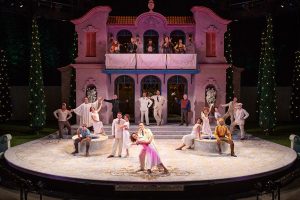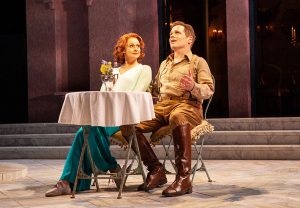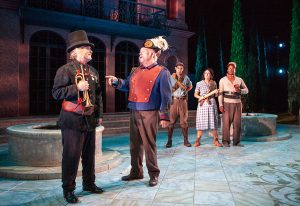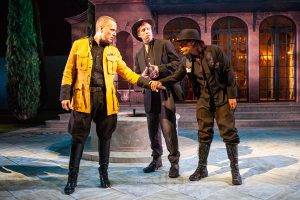Sleek ‘Much Ado’ Takes a Mediterranean Break At The Old Globe
A prized discovery for the veteran Shakespeare idolater is finding some new insight that delights and surprises among the old familiar cadences. Be it a fresh line-delivery, a quirk of illuminating performance or some rethought overall approach, such treasures are added rewards for those with the patience of true disciples.
An invigorating example of discovery is included in Kathleen Marshall’s sleek, sure-footed production of Much Ado About Nothing, now at the Old Globe Theatre, where it’s the 13thvariation in 83 years (says the official show program.) Amidst the purring of the two romantic plots and the broad comedy scenes, one often overlooked role is made impossible to ignore and therefore gives the whole show a nice bump of discovery.

The company of Much Ado About Nothing, by William Shakespeare, at the Old Globe Theatre. Jim Cox Photo
Marshall has plunked the play down into the Italian Fascist fantasyland of a 1930s Mediterranean resort. Don Pedro, the prince of Arragon, is heading home from bullying some weaker kingdom but ready for a break. Leonato, the governor of Messina, invites Pedro and all his army to kick back there for a few days. (All this geography is unimportant. Like the “seacoast of Bohemia.” It all eventually turns into Elizabethan London anyway.)
So, POOF! It’s the Riviera by Cole Porter. John Lee Beatty’s two-story summer set for the Lowell Davies Festival Theatre stage fairly drips with ripe foliage in the swoony lighting of Stephen Strawbridge, then brightens on cue for the languid days. All the aristocrats strut their formals and Michael Krass gives the bourgeoisie a carefully colorful genre look.
But it’s the music that delights. “Life Is Just a Bowl of Cherries.” “Smile.” “Just a Gigolo.” “Let’s Do It.” All played in the flowing sophistication of that Django Reinhardt/Stephane Grappelli guitar-violin tradition. The concept is terrific, the song list is solid and all’s well except…the playing! High marks to the Globe for the live music but, come on! There probably are dozens of professional-grade players available here who would instantly get the gig’s needs. Unfortunately, these two don’t. No feeling, no bounce, no understanding of the reference, just straight ahead as if reading from a Django/Grappelli fake book.

Sara Topham and Michael Hayden as Beatrice and Benedict in the Old Globe’s Much Ado About Nothing. Jim Cox Photo
It’s hard to quarrel with the actor casting decisions. As Beatrice and Benedict, the merry malcontents stuck in all this plush idleness, Sara Topham and Michael Hayden volley and serve the flashing words with infectious enthusiasm and a minimum of arch ennui, never losing the pulse right up until the plot drops its thunderbolt. Maybe someday a director will stage one of their clashes as a fencing match. These two could keep right up, I’ll bet.
Michael Boatman as the prince and Rene Thornton Jr. as the governor reap the rewards of cultivating a casual mature authority, though a flash of monarchal ire wouldn’t be amiss. Fred Applegate is relaxed and in total comedy control as everybody’s favorite malaprop maestro, the head constable Dogberry. James Newcomb assists him as a dimming civic bulb with aplomb equal to that he uses alternatively as Leonato’s brother.

The Old Globe Much Ado About Nothing cast includes, left to right, James Newcomb, Fred Applegate, Jose Martinez, Samantha Sutliff and Renardo Charles Pringle Jr. Jim Cox Photo
Claudio and Hero, two privileged blue-bloods dizzy with repressed yearning for each other, are among Shakespeare’s least rewarding romantic leads, but the lissome Morgan Taylor and the stalwart Carlos Angel-Barajas do what they can. And the waiting lady character Margaret, played expansively by Nora Carroll, remains the enigma that she always is, one of those characters who has only to speak up and all the play’s problems would be solved. Ms. Marshall moves her quickly off stage at the key moment but hasn’t figured out how to make Margaret’s later reemergence work any better than did her dozen predecessor directors at the Globe.
And that new insight I mentioned earlier? It’s a big help to a neglected driver of the plot.
Don Pedro’s bastard brother Don John, discredited and barely tolerated because of misfired political schemes, mutters and scowls on the margins of the play, calling himself, “…a plain-dealing villain.” He ought to know. But there’s just not enough villainy around to justify a Richard III or and Iago, so most DJs usually just pout.

Manoel Felciano , Eric Weiman and Yadira Correa, left to right, in Much Ado About Nothing at the Old Globe. Jim Cox Photo
Not Manoel Felciano. He never stops. Any mild slight of protocol in the formal scenes becomes an insult. When someone turns away from him, he tends to mock them savagely. His mesmerized henchmen, more loyal that seems credible, bring him scraps of gossip that he shapes into what sound like plausible scandals. Then he drifts in, as polished as any other courtier, to set his plots ticking. He’s one of the best dancers onstage and damned if he doesn’t show up at the finale playing the fiddle! Maybe he needs monitoring, but Felciano strikes the sort of spark Shakespeare always can use. Most shows can, in fact.
And he leaves me not in the mood to brood over oddities like Claudio’s too-short military blouse and the fact that one of the Nightwatch is armed with a plumbers’ friend. There’s too much that’s too smooth about this show to worry with such trifles.
(Continues on the outdoor Lowell Davies Festival Theatre stage at 8 p.m. daily except Mondays through Sept. 16, 2018.)

Welton Jones has been following entertainment and the arts around for years, writing about them. Thirty-five of those years were spent at the UNION-TRIBUNE, the last decade was with SANDIEGO.COM.


